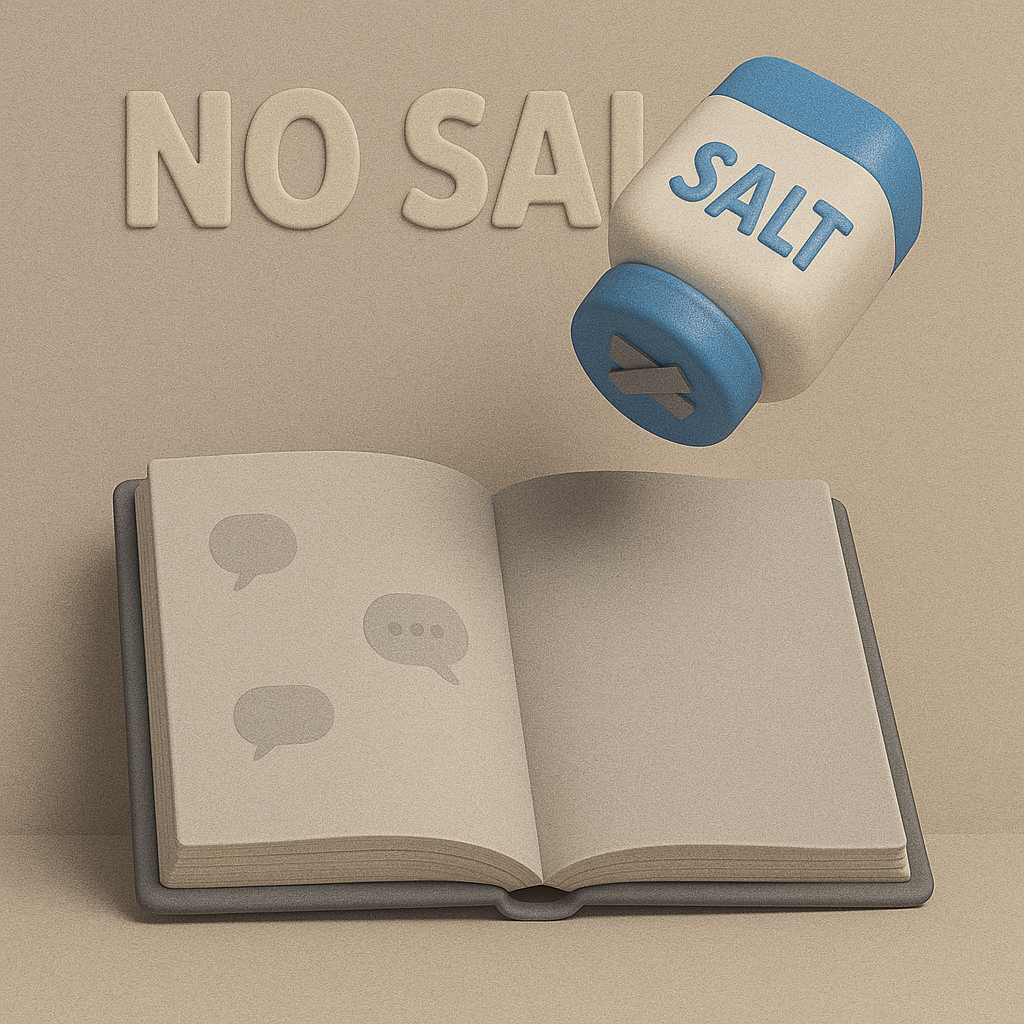Salt
Definition
The term "salt" describes a mineral primarily composed of sodium chloride (NaCl), commonly used as a seasoning and preservative. It can also refer to witty or sharp speech, or figuratively, to zest or vitality.
Parts of Speech
- Noun
- Verb
Pronunciation
American English
- IPA Pronunciation: /sɔlt/
- Respelling: sawlt
British English
- IPA Pronunciation: /sɒlt/
- Respelling: solt
Etymology
The word "salt" originates from the Old English "sealt," derived from Proto-Germanic "saltan" and Proto-Indo-European "sal-," meaning "salt." Historically, salt was a valuable commodity, often associated with preservation and trade.
Derivatives
- Salty (adjective)
- Salting (noun)
- Saltiness (noun)
- Desalt (verb)
- Salted (adjective)
Synonyms
- Sodium chloride
- Brine
- Seasoning
Antonyms
- None
Usage
The term "salt" is widely used in culinary, chemical, and figurative contexts. For example, "Add a pinch of salt to the dish" (noun, substance) or "He salted the meat to preserve it" (verb, action).
Related Terms
- Seasoning: Substances used to enhance the flavor of food.
- Preservative: A substance used to prevent decay or spoilage.
- Mineral: A naturally occurring solid chemical substance.
Detailed Definitions
Noun
- A white crystalline substance (sodium chloride): Commonly used for flavoring and preserving food.
- Example: "She added a pinch of salt to the soup."
- Wit or sharpness in speech: Refers to pointed or flavorful expression.
- Example: "His speech was full of salt and humor."
- Vitality or zest (figurative): Refers to liveliness or interest.
- Example: "The story lacked salt, making it less engaging."
Verb
- To add salt to something: Refers to the act of seasoning or preserving food.
- Example: "She salted the fish to prepare it for drying."
- To sprinkle or treat with salt: Refers to the application of salt to various surfaces or items.
- Example: "The roads were salted to prevent ice formation."
salt



🇨🇳 Mandarin
- 盐 (Salt, mineral): Yán
- IPA: /jɛn˧˥/
- Respell: Yen
- 机智的回答 (Salt, witty remark): Jīzhì de huídá
- IPA: /t͡ɕi˥˥.ʈ͡ʂʐ̩˨˩˦.tə˥˩.xweɪ˨˩˦.ta˥˥/
- Respell: Ji-zhi de hui-da
🇮🇳 Hindi
- नमक (Salt, mineral): Namak
- IPA: /nəmək/
- Respell: Nuh-muhk
- चुटकी (Salt, witty remark): Chutki
- IPA: /tʃʊʈkiː/
- Respell: Chu-tki
🇪🇸 Spanish
- Sal (Salt, mineral): Sal
- IPA: /sal/
- Respell: Sal
- Picardía (Salt, witty remark): Picardía
- IPA: /pikaɾˈdia/
- Respell: Pika-r-dia
🇫🇷 French
- Sel (Salt, mineral): Sel
- IPA: /sɛl/
- Respell: Sel
- Piquant (Salt, witty remark): Piquant
- IPA: /pikɑ̃/
- Respell: Pi-kan
🇸🇦 Modern Standard Arabic
- ملح (Salt, mineral): Milh
- IPA: /milħ/
- Respell: Mil-h
- ملح الحديث (Salt, witty remark): Milh al-hadith
- IPA: /milħ alħadiːθ/
- Respell: Mil-h al-ha-deeth
🇧🇩 Bengali
- লবণ (Salt, mineral): Lôbôṇ
- IPA: /lɔbɔn/
- Respell: Lo-bo-n
- মেজাজি উত্তর (Salt, witty remark): Mejaji uttar
- IPA: /meʤadʒi uttor/
- Respell: Me-ja-ji ut-tor
🇷🇺 Russian
- Соль (Salt, mineral): Sol'
- IPA: /solʲ/
- Respell: Sol
- Острота (Salt, witty remark): Ostróta
- IPA: /ɐsˈtrotə/
- Respell: Os-tro-ta
🇵🇹 Portuguese
- Sal (Salt, mineral): Sal
- IPA: /saw/
- Respell: Saw
- Ironia (Salt, witty remark): Ironia
- IPA: /iɾoˈniɐ/
- Respell: I-ro-nia
🇮🇩 Indonesian
- Garam (Salt, mineral): Garam
- IPA: /ˈgaram/
- Respell: Ga-ram
- Sindiran (Salt, witty remark): Sindiran
- IPA: /sindiran/
- Respell: Sin-di-ran
🇩🇪 German
- Salz (Salt, mineral): Salz
- IPA: /zalts/
- Respell: Zalts
- Witz (Salt, witty remark): Witz
- IPA: /vɪʦ/
- Respell: Vi-ts
🇯🇵 Japanese
- 塩 (Salt, mineral): Shio
- IPA: /ɕio/
- Respell: Shi-o
- 皮肉 (Salt, witty remark): Hiniku
- IPA: /çinikɯ/
- Respell: Hi-ni-ku
🇻🇳 Vietnamese
- Muối (Salt, mineral): Muối
- IPA: /mwoj˧˩/
- Respell: Mwoi
- Châm biếm (Salt, witty remark): Châm biếm
- IPA: /cəːm˧ˀ˨ʔ biəm˧ˀ˨ʔ/
- Respell: Cham biem
🇰🇷 Korean
- 소금 (Salt, mineral): Sogeum
- IPA: /soɡɯm/
- Respell: So-geum
- 재치 있는 말 (Salt, witty remark): Jaechi inneun mal
- IPA: /t͡ɕetɕʰi inɯn mal/
- Respell: Jae-chi in-neun mal
🇹🇷 Turkish
- Tuz (Salt, mineral): Tuz
- IPA: /tuz/
- Respell: Tuz
- Espritüel söz (Salt, witty remark): Espiritüel söz
- IPA: /espiɾitʲyel søz/
- Respell: Es-pi-ri-tyel soz
🇵🇰 Urdu
- نمک (Salt, mineral): Namak
- IPA: /nəmək/
- Respell: Nuh-muhk
- زرافہ (Salt, witty remark): Zarafa
- IPA: /zəɾaːfaː/
- Respell: Za-ra-fa





